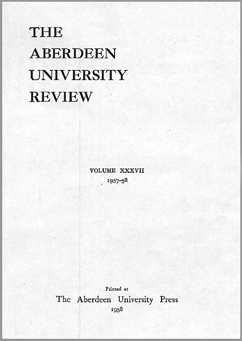
Born at Hockley Heath, Warwickshire, he was educated at Solihull School, Warwickshire, and the Universities of Birniingham, Lyons and Paris. During the First World War, he served as a 2nd Lieutenant in the Royal Warwickshire Regiment (1915-16), then as Lieutenant in the Machine Gun Corps (1916-19). He was wounded in France in 1916.
He was appointed English assistant in the University of Lyons (1919-20, 1921-22) where he took the Licence-ès-Lettres. He became Docteur de l’Université de Paris in 1923. His thesis: "Taine et l’Angleterre ", was awarded a prize by the French Academy in 1924. That prize, the "Prix Bordin" had been previously awarded to only two Britishers, one of them being Rudyard Kipling and the other Professor L. Graeme Ritchie (a graduate of Aberdeen University, Professor of French at the University of Birmingham).
After a year as Lecturer in French at Birmingham, he was appointed to his first Scottish post, as Lecturer and Joint-Head of the French Department in the University of St. Andrews (1925-28). He then became Professor of French in thee newly created University College of Hull, where he spent four active years, creating a centre of French studies and organizing contacts with French culture both inside and outside the University College.
In 1932, he was appointed to the Carnegie Chair of French in the University Aberdeen, and threw himself enthusiastically into the task, made particularly congenial by the old association between Scotland and France. Perhaps it was his feelings for France which made him, an Englishman, feel so very much at home in Scotland. As much as any Scot, he fell under the spell of King’s College and Old Aberdeen. He did everything in his power, both as Professor of French and as Chairman of the Franco-Scottish Aberdeen Centre, to encourage contacts between the two countries. Some may remember for instance, a few years ago, his speech at the opening of the exhibition of the Ecole de Paris at the Art Gallery in Aberdeen, his lectures on various subjects always enlivened by the sparkle of his good humour and wit, and also the encouragement he gave to the organization of French tbeatrical representatsons for the schools.
His activities, however, extended beyond that scope. One may mention his visit to Canada in 1937, when he was director of the French Summer School at McGill University, Montreal. His interest in comparative literature studies - his own "Taine et l’Angleterre" ranks him among the creators of the modern school of comparative studies - kept him in constant touch with his colleagues in Europe and America. In 1948, he was elected vice-president of the Fédération Internationale des Langues et Littératures Modernes, and in 1955, vicepresident of the International Association of Comparative Literature. The papers he read at various international congresses range over such varied subjects as "Taine’s political ideas", "Taine and English art" , "Venice in English Literature", etc. He wrote in a number of British, American and French reviews.
Nor are his interests confined to literature and art, a sympathetic approach to people, an intcrest in all aspects of their life, are his characteristics, and his natural amiability and ease of manner won him an entry in spheres abroad not usually open to the foreigner. He thus acquired an insight into economic and social conditions which manifested itself first in his editing of La France Laborieuse, a collection of extracts showing various aspects of economic life in France, from rare or humble crafts to the wheels of modern industry. This interest in people’s life and work, the harmony betweeen a country and its inhabitants shows itself even more conclusively in tbe book to which he devoted several years of work, and which is the outcome of more than forty years of acquaintance with France and the French, Modem France: an introduction to French ciuilization. This book was hailed both in England and France as a notable contribution to international understanding. The book was in the press when Professor Roe became ill, and came out while the author was still in hospital.
The occasion of a literary tercentenary, that of Sir Tbomas Urquhart’s translation of Rabelais, turned, four years ago, his thoughts towards a little known connection between Aberdeen - since Sir Thomas was a King’s College student - and France. He contributed several articles on Urquhart to varions reviews, and an address on Urquhart, translator of Rabelais delivered to the learncd Association Guillaume Budé was later revised and enlarged. This work led him to the discovery of some hitherto unknown sources of Urquhart’s epigrams in the shape of a small volume of French epigrams, dated 1622, on the more obscure shelves of the Bibliothéque Nationale. The life and works of Urquhart were the subject of a lecture dcivered at the Taylor Institute, Oxford, in February 1957. A note on this lecture will bc found among the book reviews in this issue.